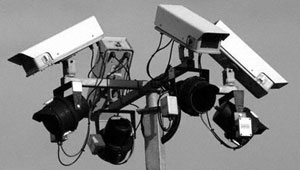Should have entered the CCTV business years ago. Those cameras sell! Now cops even set up cameras that watch the cameras that watch you. London, with more video cameras than any other urban area in the world, has more than 400,000 CCTV cameras installed, that’s about one camera for every 14 people. Crime-happy Bangkok will install one million more (!) spy cams in the name of project “Miracle Eyes.” Who the hell is watching all that footage. More importantly: does the world become a better place?

But I have a problem with well-connected suppliers making big bucks from something that is — let’s be honest — not really preventing the misery of the world. As a rule of thumb for every 1,000 CCTV cameras one single crime gets solved. And that’s an optimistic estimate.
Police themselves seem to admit they have no widespread evidence that CCTV solves crimes. Footage is often blurred and angles make it impossible to identify a face, let alone read a car’s license plate. CCTV delivers not much hard evidence. Acting as deterrents may be their main benefit, that’s why even dummy CCTV cameras are a big market, making people think that a real surveillance camera is in operation.
So while state authorities are exercising their right to freedom of surveillance, we, the vitreous CCTV citizens, barely dare to shoot in public anymore. For some, you’re either a pervert or terrorist by just pointing your lens at anyone maybe visible in the frame. Basically they take me and you and everyone for Bin Laden 2.0.
Something’s not right. By criminalizing photography authorities and diehard sectors of the public make no difference between taking a picture and the use of a picture.
Something clearly got out of hand. Talk 9/11 and the impact on civil rights and freedom of photography. Well I keep on shooting, and be it from the hips with no one realizing.
Hey someone has to watch those who watch.


